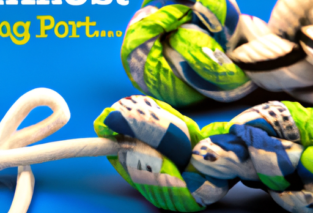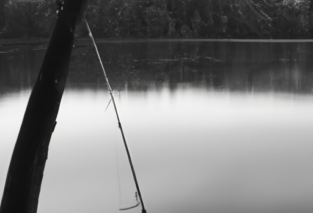If you’re an angler who loves the thrill of fishing in warm water, then “Can You Go Fishing in Warm Water: Tips and Techniques for Warm-Water Anglers” is the ultimate guide for you. Packed with valuable insights and expert advice, this comprehensive resource covers everything you need to know about fishing in warm water. From tips on choosing the right gear to techniques for targeting different species, this guide will help you make the most of your warm-water fishing adventures. So grab your fishing rod, soak up the sun, and get ready to reel in some unforgettable memories.

Selecting the Right Gear
When it comes to fishing in warm water, selecting the right gear is essential for a successful and enjoyable experience. Understanding the water temperature, choosing the appropriate fishing rod, selecting the right fishing line, and picking the right hooks and baits are all important factors to consider.
Understanding the Water Temperature
Before heading out to fish in warm water, it’s crucial to understand the water temperature. Different fish species have different temperature preferences, so knowing the temperature range preferred by your target species is key. Warm-water fish such as bass, catfish, and crappie thrive in water temperatures ranging from 70 to 80 degrees Fahrenheit.
Choosing the Appropriate Fishing Rod
When it comes to selecting a fishing rod for warm-water fishing, you should consider factors such as the strength, flexibility, and length of the rod. For warm-water fishing, a medium to heavy-action rod is generally recommended to handle the potentially larger and more aggressive fish found in warm water.
Selecting the Right Fishing Line
The fishing line you choose can greatly impact your success as a warm-water angler. Monofilament and fluorocarbon lines are popular choices for warm-water fishing due to their strength and low visibility in the water. It’s essential to choose a line with the appropriate weight and thickness based on the species you’re targeting and the type of fishing you’re doing.
Picking the Right Hooks and Baits
Selecting the right hooks and baits is crucial for enticing fish to bite in warm water. When it comes to hooks, options such as a worm hook, treble hook, or circle hook can be effective, depending on the fishing technique and target species. As for baits, options like plastic worms, crankbaits, spinnerbaits, and topwater lures can be successful in warm-water conditions. Experimentation and adjusting your selection based on the behavior of the fish can greatly increase your chances of success.
Understanding Fish Behavior in Warm Water
To become a successful warm-water angler, it’s important to understand fish behavior in warm water. The effect of warm water on fish, identifying the best fishing spots, observing fish feeding patterns, and adjusting fishing techniques to warm water conditions are all important aspects to consider.
The Effect of Warm Water on Fish
Warm water has a significant impact on fish behavior. As water temperatures rise, fish tend to become more active, increasing their metabolism and feeding behaviors. Bass, for example, tend to move from deeper water to shallower areas and become more aggressive in their pursuit of prey. Understanding how warm water affects the behavior of your target species can help you strategize and select the appropriate fishing techniques.
Identifying the Best Fishing Spots
Knowing where to find fish in warm water is essential for a successful fishing trip. Warmer water tends to hold less oxygen, so fish often seek areas with vegetation, shade, or structure that provide them with shelter and access to food. Look for areas such as underwater vegetation, rocky structures, drop-offs, and points where warm-water fish are likely to congregate.
Observing Fish Feeding Patterns
Observing the feeding patterns of fish in warm water can provide valuable insights into their behavior. Many warm-water fish species are ambush predators, meaning they wait for prey to come within striking distance before attacking. Paying attention to when and how fish feed can help you determine the best time and techniques to catch them.
Adjusting Fishing Techniques to Warm Water Conditions
Fishing techniques that work well in cooler water may need to be adjusted for warm water conditions. In warm water, fish are more active and more likely to strike at faster-moving baits or lures. Techniques such as topwater fishing, deep diving crankbaits, soft plastic baits, jigging, Carolina rig fishing, and fly fishing can all be highly effective in warm-water conditions. Experimenting with different techniques and adjusting your approach based on fish behavior can lead to success on the water.
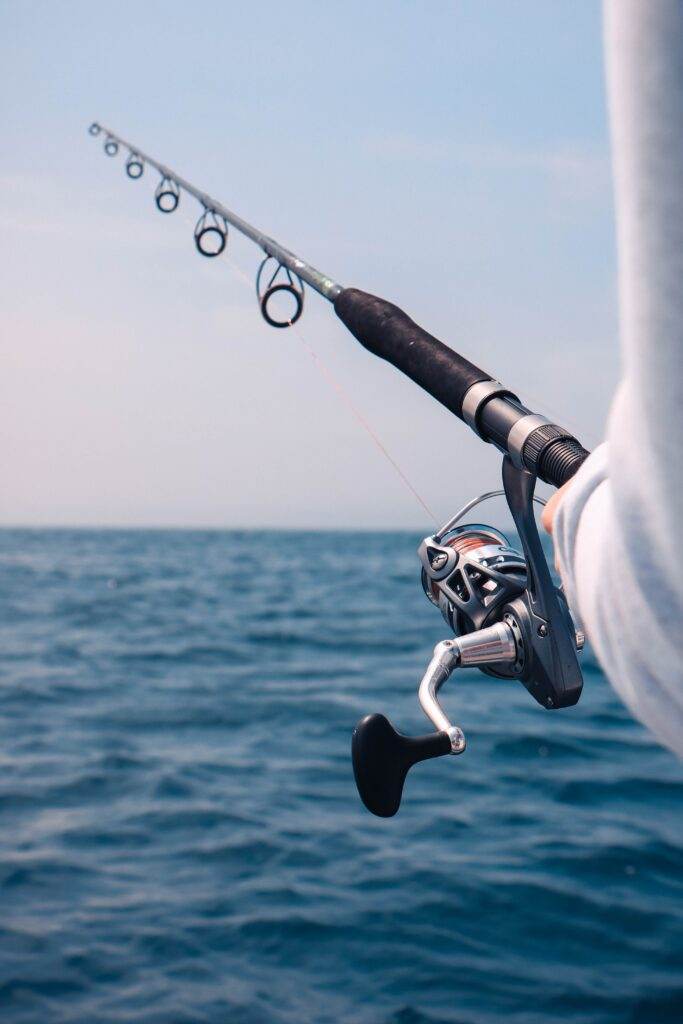
Techniques for Fishing in Warm Water
Mastering specific fishing techniques can greatly enhance your success as a warm-water angler. Let’s explore some of the most effective techniques for fishing in warm water.
Topwater Fishing
Topwater fishing is an exciting technique that involves presenting lures on the water’s surface. This technique mimics the movement of injured baitfish or other prey, attracting predatory fish to strike. Topwater lures such as poppers, buzzbaits, and prop baits are commonly used in warm-water fishing. The visual thrill of seeing fish explode at the surface and the adrenaline rush of the strike make topwater fishing a favorite among anglers.
Deep Diving Crankbaits
Deep diving crankbaits are effective for targeting fish that are holding in deeper water during warm weather. These lures are designed to dive to specific depths and mimic the movements of injured or struggling baitfish. By varying retrieve speeds and depths, anglers can effectively cover a larger area and entice fish to strike.
Soft Plastic Baits
Soft plastic baits, such as plastic worms, lizards, and creature baits, are versatile and effective in warm-water fishing. These baits can be rigged with various hooks and weights depending on the desired presentation. The lifelike movement and texture of soft plastics make them a favorite among anglers targeting species like bass and catfish.
Jigging Techniques
Jigging is a technique that involves using a weighted lure known as a jig to imitate the movements of prey fish. Warm-water fish, such as bass and walleye, are often drawn to jigs due to their enticing action and versatility. Jigging can be done vertically from a stationary position or by casting and retrieving the jig. Adjusting the depth and speed of your jigging can help you target fish in different water columns.
Carolina Rig Fishing
The Carolina rig is a versatile and effective technique for fishing in warm water. This technique involves attaching a sliding weight to the fishing line, followed by a swivel and leader with a hook and bait. The Carolina rig allows the bait to move naturally, enticing fish to strike. It is particularly effective for targeting bottom-dwelling species such as catfish and bass.
Fly Fishing in Warm Water
Fly fishing is not just reserved for trout and salmon. Warm-water fly fishing can be a thrilling and successful pursuit. Using larger flies that imitate insects, baitfish, or even mice, anglers can target warm-water species such as bass, panfish, and even carp. The delicate presentation of a well-tied fly and the explosive strike of a warm-water fish on the surface make fly fishing a unique and enjoyable experience.
Tips for Success in Warm-Water Fishing
To maximize your success as a warm-water angler, consider the following tips:
Time of Day Matters
Pay attention to the time of day, as fish tend to be more active during certain periods. Early mornings and late afternoons are often the best times to fish in warm water, as the cooler temperatures and low light conditions make fish more active and willing to bite.
Fishing During the Right Season
Understanding the seasonal patterns of fish behavior can greatly enhance your chances of success. In warm-water fishing, spring and early summer are typically the most productive seasons, as fish are in their spawning and feeding modes. However, different species may exhibit different seasonal patterns, so it’s essential to research and adapt your fishing strategies accordingly.
Paying Attention to Water Depth
Water depth plays a vital role in warm-water fishing. Different species of fish have varying preferences for water depth based on their feeding and breeding habits. Experimenting with different depths and adjusting your presentation can lead to more successful fishing trips.
Being Patient and Persistent
Patience and persistence are virtues in any form of fishing, and warm-water fishing is no exception. Fish behavior can be unpredictable, and not every cast will result in a bite. Stay focused, observe fish behavior, and adjust your techniques accordingly. Remember, a slow day of fishing can always turn into an exciting one with the right approach and mindset.
Using Polarized Sunglasses
Polarized sunglasses are invaluable for warm-water fishing. They not only protect your eyes from harmful UV rays but also allow you to see beneath the water’s surface. Polarized lenses reduce glare, allowing you to spot fish, vegetation, and underwater structures more easily. This visibility gives you a significant advantage when it comes to targeting fish in warm water.
Staying Hydrated and Protected
Spending long hours fishing in warm water can be physically demanding. It’s important to stay hydrated by drinking plenty of water and protecting yourself from the sun’s harmful rays. Wearing sunscreen, a wide-brimmed hat, and lightweight, breathable clothing can help prevent sunburn and heatstroke.
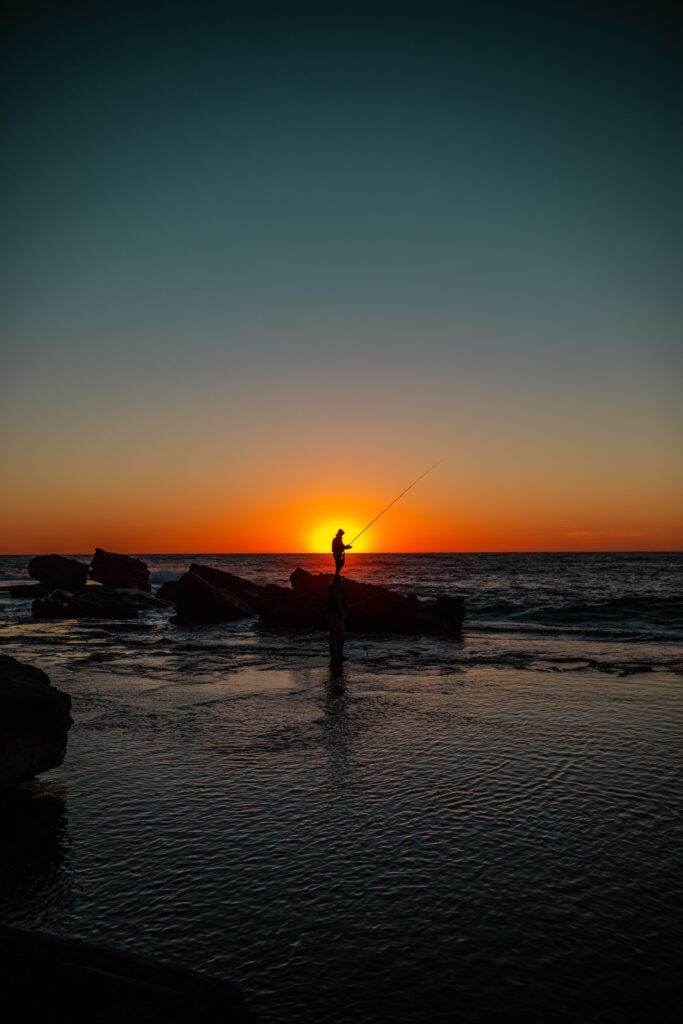
Safety Precautions for Warm-Water Anglers
While warm-water fishing can be exciting and rewarding, it’s essential to prioritize safety. Here are some safety precautions to keep in mind:
Keeping an Eye on Weather Forecasts
Always check the weather forecast before heading out to fish in warm water. Sudden storms or extreme heat can pose risks to your safety. Avoid fishing during severe weather conditions and be prepared to seek shelter if necessary.
Knowing the Water Regulations
Familiarize yourself with the local fishing regulations and obtain any required licenses or permits. Follow catch limits, size restrictions, and any seasonal closures to ensure the sustainability of the fish populations and avoid legal consequences.
Being Aware of Local Hazards
Different bodies of water may have specific hazards that anglers should be aware of. These may include submerged rocks, strong currents, underwater vegetation, or dangerous wildlife. Take the time to research and understand the potential hazards of the fishing area to ensure your safety.
Using Proper Sun Protection
Protecting yourself from the sun’s harmful rays is crucial when fishing in warm water. Apply sunscreen regularly, wear a wide-brimmed hat, and use protective clothing to shield your skin from excess sun exposure. Remember, even on cloudy days, harmful UV rays can still penetrate the skin.
Boat Safety Measures
If you’re fishing from a boat, prioritize boat safety measures. Ensure that your boat is in good working condition, always wear a properly fitted life jacket, and have essential safety equipment such as a whistle, flashlight, and first aid kit on board. Be mindful of the weight capacity of your boat and avoid overcrowding that can lead to accidents.
Warm-Water Fishing Ethics
Ethical fishing practices are critical in preserving and protecting our aquatic ecosystems. When fishing in warm water, it’s important to consider the following ethics:
Handling Fish Properly
Properly handling fish is essential for their survival after catch and release. Wet your hands before handling the fish to prevent removing its protective slime. Use fish-friendly landing nets or fish grips to reduce stress and minimize injury. Handle the fish gently and release it back into the water as quickly as possible.
Practicing Catch and Release
Catch and release should be practiced whenever possible. Releasing fish allows them to grow, reproduce, and maintain healthy populations. Use barbless hooks or crimp down the barbs on your hooks to make hook removal easier and reduce injury to the fish. Release the fish gently, ensuring it has fully recovered before releasing it back into the water.
Respecting the Natural Habitat
Respecting the natural habitat of the fish you’re pursuing is vital. Avoid disturbing aquatic vegetation, nesting areas, or spawning grounds. Dispose of trash properly and leave the fishing area as clean as or cleaner than you found it. By minimizing our impact on the environment, we can ensure healthy ecosystems for future generations of anglers.
Sharing the Reducing Impact Advice
Spread the word about reducing the environmental impact of warm-water fishing. Educate fellow anglers about ethical fishing practices, proper catch and release techniques, and the importance of preserving our natural resources. Together, we can create a community of responsible anglers dedicated to sustainable fishing practices.
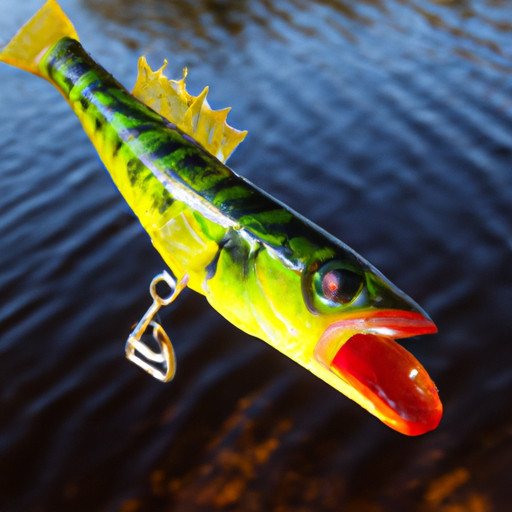
Warm-Water Fishing Destinations
For anglers seeking warm-water fishing destinations, there are plenty of options to choose from. Here are some popular warm-water fishing spots, best warm-water fishing lakes, hidden gems, and international hotspots to consider:
Popular Warm-Water Fishing Spots
Popular warm-water fishing spots in the United States include the Florida Everglades, the Gulf Coast of Texas, California Delta, and the Chesapeake Bay. These locations boast a variety of warm-water species and offer exciting fishing opportunities for both novice and experienced anglers.
Best Warm-Water Fishing Lakes
Warm-water fishing lakes in the United States are scattered throughout the country, providing anglers with diverse options. Some notable warm-water fishing lakes include Lake Guntersville in Alabama, Lake Okeechobee in Florida, Lake Lanier in Georgia, and Lake Champlain in New York. These lakes offer excellent opportunities to target warm-water species and enjoy the beauty of their surroundings.
Hidden Gems for Warm-Water Anglers
Sometimes, the best fishing spots are hidden gems known only to the locals. Exploring lesser-known lakes, rivers, and reservoirs can lead to exciting discoveries. Researching local angler forums, social media groups, or consulting with local tackle shops can help you uncover hidden gems in your area.
International Hotspots for Warm-Water Fishing
For anglers looking to broaden their horizons, there are plenty of international hotspots for warm-water fishing. Destinations such as the Amazon River in Brazil, Lake Victoria in Africa, the Great Barrier Reef in Australia, and the Maldives in the Indian Ocean offer unique and thrilling warm-water fishing experiences. Research local regulations, hire experienced guides, and immerse yourself in the local culture for an unforgettable fishing adventure.
Understanding the Impact of Global Warming on Warm-Water Fishing
As global warming continues to pose significant challenges to our planet, warm-water fishing is not immune to its effects. Understanding the impact of global warming on warm-water fishing, its implications, conservation efforts, and promoting sustainable fishing practices are crucial factors to consider.
Climate Change and Its Effects
Global warming and climate change have led to rising water temperatures worldwide. Warmer water affects fish behavior, migratory patterns, reproduction, and overall ecosystem health. Changes in water temperature can lead to shifts in fish populations, potentially disrupting the balance of aquatic ecosystems.
Implications for Warm-Water Fishing
The implications of global warming for warm-water fishing are far-reaching. Some warm-water fish species may migrate to cooler waters, limiting their availability for anglers in traditional warm-water fishing locations. Changes in water temperature can also affect the availability and abundance of prey fish, potentially impacting the feeding patterns and behavior of target species.
Conservation Efforts in the Face of Global Warming
Conservation efforts are crucial in mitigating the impacts of global warming on warm-water fishing. Protecting and preserving aquatic habitats, implementing sustainable fishing practices, and adhering to catch limits are essential steps in maintaining healthy fish populations. Supporting organizations dedicated to environmental conservation, engaging in habitat restoration projects, and participating in citizen science initiatives are ways anglers can contribute to conservation efforts.
Promoting Sustainable Fishing Practices
Promoting sustainable fishing practices is vital for the future of warm-water fishing. Adopting catch and release practices, using barbless hooks, minimizing the use of live bait, and avoiding sensitive spawning areas can help protect fish populations. Additionally, reducing plastic waste, properly disposing of fishing line, and advocating for responsible angling practices can contribute to the sustainability of our aquatic ecosystems.
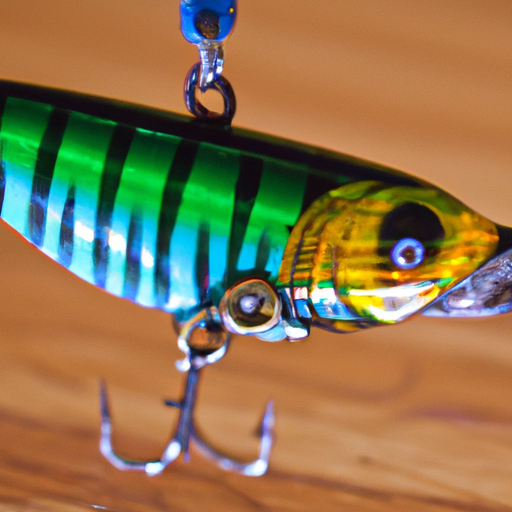
Resources for Warm-Water Anglers
For warm-water anglers seeking further information, various resources are available to enhance your knowledge and skills. Consider exploring books and publications, websites and online communities, local angler clubs, and tackle shops and gear rental services.
Books and Publications
There are numerous books and publications that offer valuable insights and tips for warm-water fishing. Look for titles such as “Bass Fishing 101: Techniques for Success in Warm Water,” “Crappie Fishing Made Easy: Tips and Tricks for Warm-Water Anglers,” or “The Complete Guide to Warm-Water Fly Fishing.” These resources can provide in-depth knowledge and guidance to help you become a more successful warm-water angler.
Websites and Online Communities
The internet is a treasure trove of information for warm-water anglers. Websites dedicated to fishing, online forums, and social media communities provide platforms for anglers to share their experiences, exchange tips and techniques, and seek advice. Joining these online communities can connect you with like-minded anglers and expand your knowledge base.
Local Angler Clubs
Local angler clubs are an excellent resource for warm-water anglers. These clubs often hold regular meetings, fishing clinics, and tournaments, allowing members to network and learn from seasoned anglers. Participating in club activities can provide valuable opportunities to enhance your skills, gain local insights, and exchange tips with fellow anglers.
Tackle Shops and Gear Rental Services
Your local tackle shop can be a wealth of information when it comes to warm-water fishing. Staff members are often experienced anglers themselves and can provide recommendations on gear, baits, and techniques specific to your fishing location. Some tackle shops also offer gear rental services, allowing you to try out different equipment before making a purchase.
Conclusion
Fishing in warm water can be a thrilling and rewarding experience for anglers of all skill levels. By selecting the right gear, understanding fish behavior, mastering various fishing techniques, and adopting ethical and sustainable practices, you can increase your chances of success and contribute to the conservation of our aquatic ecosystems. Explore warm-water fishing destinations, continue to learn and adapt your skills, and always prioritize safety and environmental consciousness. With these tips and techniques in mind, you’ll be well-prepared to enjoy the excitement and joy of warm-water fishing.



